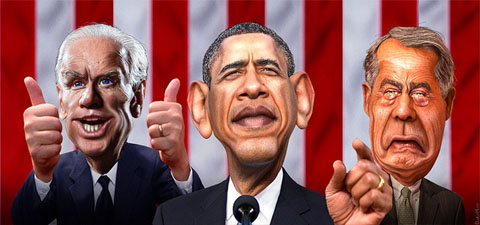
Presented to the National Board, Communist Party USA, January 22, 2015.
Our country is now confronted with a Congress controlled by a belligerent, bought-and-paid corporate minded cabal that is out to increase military spending, give even further tax cuts to the rich, and eliminate every program for people’s needs at a time when millions are struggling.
The Republican agenda was made clear from day one with immediate attacks on Social Security, immigration policy, the Affordable Care Act and women’s reproductive rights. Yet, this agenda is vulnerable because it runs counter to the majroity views of the people.
Since Barack Obama was elected President, the goal, crudely stated by Sen Mitch McConnell, was to block and prevent every initiative and destroy the presidency. Despite it all, including Supreme Court decisions undermining voting rights and allowing unrestrained money in politics, some gains have been won in the six years since George W. Bush.
As soon as the 2014 elections were over, President Obama made it clear that he was going onto the offensive for the agenda that got him elected twice. He promised to use executive action where possible (starting with immigration policy and normalizing relations with Cuba) and his veto pen where necessary to make life better for people.
He then brilliantly delivered the powerful State of the Union address and set a political climate of fightback, instead of submitting to the Republican agenda.
The address has been welcomed by labor and people’s organizations and progressive lawmakers because it gives a handle for struggle at the national and local level. It reflects majority views that are being fought for and demanded and expands possibilities to mobilize. It inspired wonderful memes on social media and sets the framework for the next two years and the 2016 elections.
By wrapping the address around the experience of one struggling family, he was able to highlight the economic progress that has begun, indicate the long way still to go, and call upon engagement for common values.
The middle class economics agenda he projected takes on the bankrupt concept of trickle down economics and begins to address economic inequality by placing the need to close loopholes on taxes for billionaires and corporations in order to provide resources for child care, universal Pre-K and free community college.
From a working class perspective, we realize this just begins to meet the needs, but the door is opened to support this significant beginning and also project more sweeping progressive tax reforms to address the contradiction of growing poverty and racism in our communities while the 1% enjoys practially all of the fruits of the economic recovery.
The focus of the middle class economics agenda on wages and jobs speaks to widespread frustrations, including rasing the minimum wage, pay equity for women, overtime, paid sick days and family medical leave. President Obama draws upon successful struggles at the state amd municipal level, and examples from our country’s history to show that the proposals are sensible, realistic and winnable.
Significantly, one of the longest applauses was his acknowledgment of the need to make it easier to join a union, which we know is the best anti-poverty program and the best builder of class consciousness.
In contrast, a low point not accepted by progressive Democrats is the request for Fast Track authority laying the basis for the Trans Pacific Partnership trade agreement that is being negotiated in secret.
President Obama stood clearly for action to stem climate change with scientific research and sustainable energy, opposed the XL pipeline, and linked that to jobs by rebuilding our nation’s infrastructure.
On foreign policy, while not challenging imperialism, Obama did challenge the most virulent sectors of imperialism by calling for diplomacy over war, including a promise to veto sanctions on Iran, and a call to end the embargo on Cuba and finally close GITMO.
In the concluding section, President Obama addresses the criminal justice system and voting rights. He speaks of the sea change in marriage equality and attitudes toward lesbian, gay and transgender rights as an example of winning people over on issues of fairness and equality.
As a whole, the State of the Union address was unifying and inspiring as shown by the dial poll conducted with white swing voters by Demos and Womens Voice Womens Vote. These swing voters moved all the way from 44% warm (favorable) for Obama before the address to 66% warm (favorable) for Obama during the address.
The progressive message, especially making the rich pay their fair share and providing support for middle and low income families, speaks to everyone and provides an opening to overcome racism. It is the foundation to re-convene and enlarge the broad alliance that elected him. It is the basis for the core forces for social change to organize and engage middle and low income families who will directly benefit from higher wages, pay equity and tax relief.
Republican members of Congress were a united bloc and sat on their hands in lockstep during the State of the Union address. But there are divisions among them. For example, the 24 tea party House members who opposed Boehner for Speaker and the Republican women who opposed the 20 week abortion ban. There are differences on immigration, trade with Cuba, XL pipeline and fast track. As well, the Republicans are looking toward the 2016 elections. These divisions must be taken into account as tactics are developed going forward.
As well, a targeted approach must be developed to Democrats who vote with Republicans on key issues. For example, a number of the 35 Democrats who voted, on the second day of the session, for a bill that would have gutted Wall St. reform, have already changed their votes when constituents complained.
So the table is set for the fierce battles ahead, both in Congress and at the state level.
In her Progressive response to the State of the Union, Rep. Jan Schakowsky called this a “which side are you on?” moment. The Republican claim that progressive policy is dead on arrival is not necessarily so. Some issues will be fought legislatively (improving infrastructure, increasing the minimum wage, education support) and others can be achieved through executive action (overtime pay).
The bottom line is that if there is mass mobilization at the grass roots, victories can be won. One example is the 14 states that raised the minimum wage while the fast food workers took to the streets for $15 and a union.
The Coalition on Human Needs held a webinar indicating expected attacks by Republicans as part of the budget process, including cuts to food stanps, Social Security Disability, the Earned Income Tax Credit, and an attempt to voucherize Medicaid. The fight to protect low income families is connected to the military spending side of the budget and also to the deamnd to tax wealth to raise more revenues.
Paul Ryan, chair of the Ways and Means committee, is preparing a program claiming to cut poverty. Like all the Republican initiatives, its substance will most probably be the opposite of its name. It is becoming more clear to the public what the extremist Republicans are all about and why they are so dangerous. In fact, the extremes of wealth and poverty do require that a real campaign aimed at those communities most deeply affected be launched.
Legislation on the themes in the State of the Union is now being introduced.
Sen. Warren is leading on a bill to make improving infrastructure and creating jobs a top priority. Sen. Bernie Sanders is proposing $1 tirllion over five years to create 13 million jobs. He is also championing a constitutional amendment to overturn Citizens United. Sen. Sherrod Brown is re-introducing the Strengthing Social Security Act. Sen. Richard Blumenthal just introduced the Women’s Health Protection Act. The Voting Rights Amendment Act of 2014 and John Lewis’ Voter Empowerment Act of 2013 are on the agenda. Just to name a few.
The extreme right-wing is also working at the state level to influence what happens in Congress. ALEC has brought a resulution to all State Legislatures for a Constitutional Convention to limit the scope of government and require a balanced budget. They say they expect passage in 31 states. If 34 states pass this language, a constitutional convention will be required. In the present situation a Constitutional Convention, which opens everything, would be very dangerous. ALEC is also bringing a union busting right to work resolution to all State Legislatures.
This is a time to organize, organize, organize in our communities, with labor and allies, and on-line with the People’s World.
The possibility is present to block the rextremist corporate Republican agenda in Congress by backing up the president’s proposals and pushing for people’s needs with grass roots actions, by working with progressives in congress, and by mobilizing with labor and allies on local issues that relate.
What happens in Congress depends in part on the strength of the mass movement. In turn, the mass movement is deeply affected by what happens in Congress We should find the ways to help connect the local and state struggles with these battles.
1. As cities and states struggle with their budget process, they will be caught by cuts in federal funding. Does the middle class economics presented by the President provide an opening to initiate resolutions, delegations, petitions and demonstrations to Congress from cities and states calling for a fair tax system that will provide the revenue needed for government to play its role?
2. The social movements to end police brutality and for living wages and to protect the executive order on immigration can have a big impact. The AFL-CIO Wage Summits to be held in key cities across the country and in early primary states also provide the opportunity for a local push for the issues related to living wages and pay equity. (Seven Cities: Atlanta, Washington, St. Louis, Philadelphia, Minneapolis, San Diego and Columbus, Ohio. Four Early Primary States: Iowa, New Hampshire, Nevada and South Carolina.
3. In the municipal elections this year and in the context of the 2016 presidential campaign, participating with local labor, community and progressive forces on the issues, in voter registration and in progressive campaigns including local efforts around Bernie Sanders and Elizabeth Warren can influence the candidates, the debates, the mobilization and the outcome.
4. The Political Action Commission is preparing an on-line pamphlet, “Save Democracy: Stop the Attck on, and Expand Voting Rights” to launch a special campaign for the voting rights bills, especially in this 50th anniversary year. President Obama will visit Selma on March 7. We hope it can be on a future agenda.
It is a time of great danger, but consciousness is rising, and it is a time of great opportunity as well. As Jan Schakowsky said in her response to the State of the Union, “this is our time.”
These are a few ideas to start off. I look forward to the discussion.
Photo: Creative Commons 3.0


 Join Now
Join Now